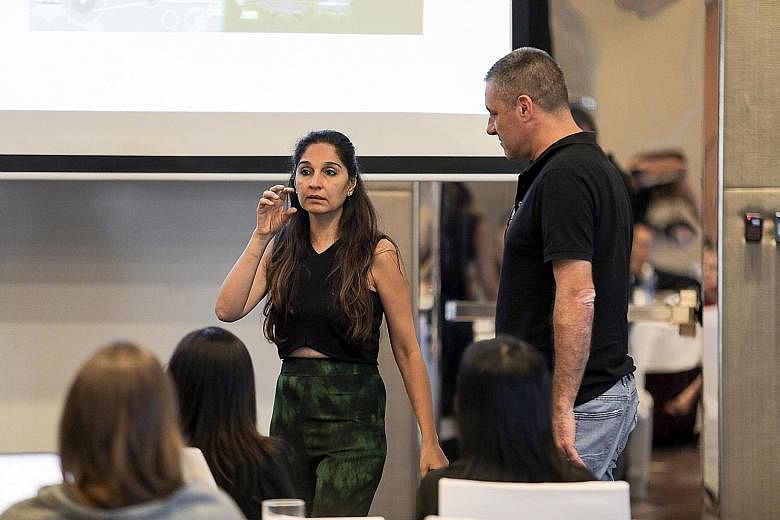Skills and smarts can open doors in life, Shagufta Anurag readily admits.
But to be a successful entrepreneur, other attributes, including perseverance, resilience and courage, are essential.
To really kick ass, however, luck and timing are also crucial.
"In life, timing is everything. You may have a great idea but the timing has to be right," says the 51-year-old.
She should know, having built three successful businesses herself.
Two decades ago, she rented a tiny 200 sq ft office in Haji Lane to start a design practice. Today, Space Matrix is a global design firm with offices in 15 cities across eight countries, including the United States, China and Australia.
For many, that would have been achievement enough. But the mother of two teenage boys went on to co-found an interior design platform called LivSpace in Singapore and India in 2014.
And three years later, the Singaporean founded Saltmine, a workplace management start-up. In February, the cloud-based platform - which allows companies to make data-driven decisions to create work spaces for their staff - raised US$20 million (S$26.9 million) in Series A funding.
Based in San Francisco, the company has nearly 130 employees in offices in New York, Singapore, Budapest and Vietnam.
Ms Shagufta grew up and spent her formative years in Bangalore, India. The second of four children, she was a premature baby who popped out of her mother's womb at seven months.
"I guess I've always been in a hurry," she quips in her immaculately appointed home in Sentosa Cove.
Her mother was an enterprising woman who sold everything from eggs to sarees and eventually set up a catering company.
Her dad, who ran a travel agency, was instrumental in shaping her personality. "He really built my confidence. He used to tell me that whatever my brother and other boys could do, I could do it better. 'You just need to believe that you can do it', he would say."
She discovered her creative abilities early in life. At 16, she was making a tidy sum, staging fashion shows and selling clothes she designed. Her designs were even worn by former Miss India Sushmita Sen.
Articulate with a tendency to break into peals of laughter, she describes herself as a free spirit.
"Growing up, I wasn't fixated on wanting to do this or become that. I just wanted to have fun; I loved doing things I was passionate about."
Upon graduation from BMS College of Architecture in Bangalore, she started working as an architect by day and selling timeshares at night. A timeshare is a property with a divided form of ownership or use rights.
"I was paid a lot more selling timeshares than I was as an architect," she says, giggling.
Money aside, the timeshare gig gave her something invaluable.
"I learnt how to articulate value propositions and sell a dream when there was nothing," she says.
She lasted only six months as an architect.
"Designing buildings requires a lot of patience since it takes a long time to get statutory approvals and other permits. By the time a project is built, four or five years would have passed. By then, there would be lots of things I would not like because I would have evolved."
She moved into interior design because "it was easy to change things and the fast pace suited me better".
When design company Interics opened an office in Bangalore, she became its first hire. The appointment changed her life.
"The boss came from England but he couldn't adapt to life in India so he left after six months," she says.
Told to hold the fort while the company tried to find a replacement, Ms Shagufta ended up running Interics for four years, doing everything from financial management to sales to business development.
By then, she had started dating Mr Anurag Srivastava, an IT professional turned venture capitalist. In 1999, she moved to Singapore after they tied the knot.
It was a game changer. Landing a job proved difficult despite her experience. When she finally found one through a client she had worked with in India, "it was at the bottom of the pyramid".
"I was cutting a lot of material boards. I was so miserable that I'd cry each time my husband picked me up from work. I'd tell him: 'Because of you, I'm in this situation'," she recalls with a guffaw.
But there was an upside to the nine months she spent there: She learnt a lot about the local design industry. "I told myself: 'I don't care if I have to design toilets but I want to do something on my own.'"
With the $5,000 she had saved up, she rented a tiny attic of an office - with a toilet - on the third floor of a shophouse in Haji Lane in 2001 and opened for business with a couple of freelancers.
The first project she won - to redo the offices of software company Hyperion Solutions - is vividly etched in her memory.
She was one of the two final candidates and had spent quite a bit of money on the pitch which involved animation. When told the company had chosen the other candidate, she stayed up that night redoing the project.
"The next morning, I sat at Hyperion's lobby until 7pm in the evening. The VP of the company came out and told me the decision had been made but I pleaded for him to at least look at my reworked project. He did it because he felt bad," she recalls.
The next morning, the party which had won the contract was late for the kick-off meeting because they had a flat tyre.
The VP then called Ms Shagufta and told her the contract was hers.
"That contract changed my life. It was worth half a million dollars. In life, hard work is sometimes not enough. You need a bit of luck," she says, adding that the project was a winner in the corporate/office category of the DuPont Antron Design Award 2002.
There was no looking back after that. Her next project, for telco T-Mobile, was worth $1 million. Other big-name clients included American Express and Bloomberg.
Within a year, she had hired 15 people and moved into a shophouse in Amoy Street. Sars hit in 2003 but left Space Matrix unscathed.
"Bigger firms were too expensive because they had too many overheads, but I could do good quality work for cost-effective prices."
It helped that she was fearless and hungry, making cold calls and walking into large companies to market her services.
Once, she found out that pharmaceutical giant Pfizer was looking to redesign its offices here.
"I made countless calls and finally got through to be told that design firms were presenting the next day. I said: 'We will present tomorrow also. Please just give me the opportunity.' My team didn't sleep that night but we won the job," she says proudly.
Her gender, she says, has never been an impediment
"It has been part of any equation for me. If I did not get a job, I'd think that maybe my work was not good enough, not because I was a woman," she says.
By 2011, the company had made it into Interior Design magazine's list of Top 100 Giants, with 400 staff in 10 locations and an annual revenue of $100 million. Today, Space Matrix is Asia's second-largest premier workplace design firm in its category, and rakes in $175 million a year.
Ms Shagufta credits the company's growth and expansion to her husband, now 54, whom she roped in as CEO in 2005.
"I was a self-taught entrepreneur; I'd never worked for large companies. There are times in an organisation when it needs different things. Space Matrix was at a stage where it needed to run and you couldn't run without processes. It was invaluable having Anurag here. He set the stage for larger level growth and freed me up to do what I enjoyed: rainmaking and winning business."
With the company in good hands, it was the perfect time to start a family. Her elder son was born in 2006, and her younger one, a year later in 2007.
Motherhood, however, did not curb her go-getting ways.
"Two days after having a caesarean, I was already having customer meetings. Nothing really changed for me," says Ms Shagufta who would take her two sons, and a helper, with her when she went on business trips abroad.
"But I'm very lucky to have a great support system. My mum was here a lot and was a great help when the boys were young."
By any yardstick, Space Matrix is a big achievement but Ms Shagufta did not rest on her laurels.
She blames it on the start-up bug.
"There was an inner calling I wanted to explore and it was a good time for me to do it," she says.
In 2014, she co-founded Livspace, a home design and decor marketplace for home owners. The platform allows them to discover thousands of interior designs for all types of rooms and personalise their choices according to colour, material and style.
All her energies now are channelled into Saltmine, a platform which houses all workplace data - including strategy, design, pricing and portfolio analytics - in one place, empowering companies to create spaces tailored to the needs of employees.
Expenditure in real estate, she says, runs into hundreds of billions of dollars a year, and is the second largest expense on the balance sheet of companies.
"Almost every vertical in an organisation company is digitally transformed - from HR to sales and finance - but if you go to the global head of real estate, he has nothing but PDFs. All the spreadsheets and information are with external service providers," she says.
It was a problem that badly needed fixing, which was why she birthed Saltmine. "It's a platform to help organisations create work spaces that can respond to the needs of the people, bringing data, people and process together."

The company already counts among its clients some of the largest occupiers of corporate real estate in the world like investment management company BlackRock, sports giant Nike and cloud computing data-based warehousing outfit Snowflake. It has also partnered major design and real estate services firms like JLL, Cushman & Wakefield, HOK and IA to create an ecosystem.
She has concrete dreams for Saltmine, and says it has the potential to be the design equivalent of Veeva Systems, the cloud-computing company focused on pharmaceutical and life sciences industry applications.
The pandemic - which has radically changed the way people work and altered the way offices are configured - has reinforced the conviction that she is on to a good thing. "Remember what I said about timing?"
• Join our Conversations on Singapore Women's Development at go.gov.sg/SGWomen. Show your support for the Celebrating SG Women movement. Visit go.gov.sg/CelebratingSGWomen to discover special deals from our partners.



